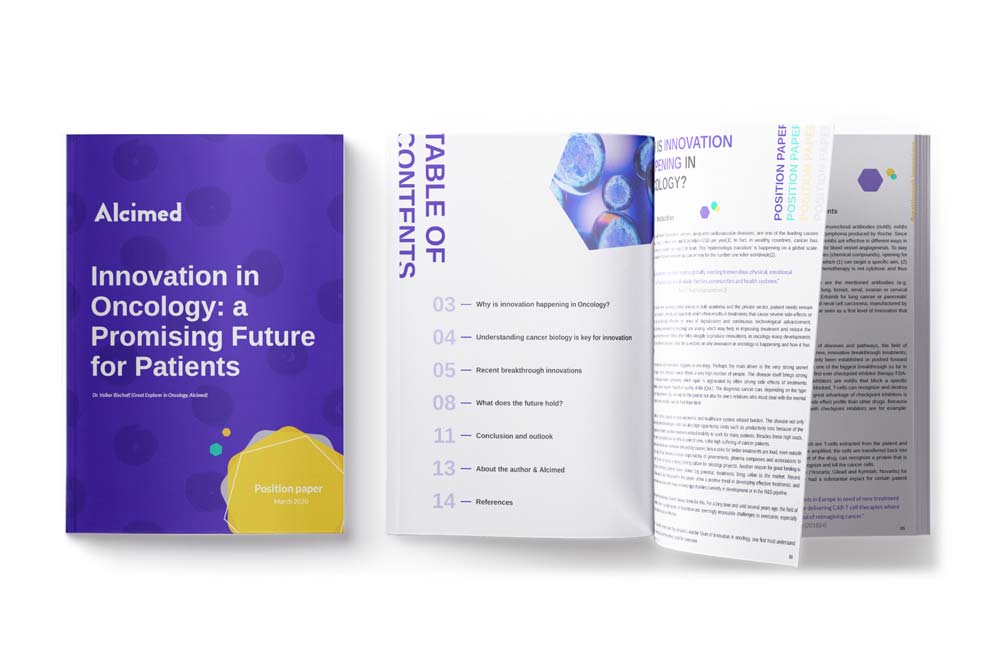Cancers and allergies: high prevalence and heterogeneous diseases
In France, cancer has become the leading cause of death before cardiovascular diseases and is now responsible for over 400,000 new cases each year (Source: INCa, 2017). On the other hand, allergies affect between 20% and 30% of the French population and this percentage continues to increase due to the augmentation of the number of allergy triggers. Because of this high prevalence and the direct and indirect associated costs, today both cancer and allergies represent an economic burden for the healthcare system.
Cancers and allergies are complex diseases for which the genetic predispositions and the environmental exposure play a major role. They are thus characterized by a large heterogeneity between patient profiles.
- In oncology, some innovative treatments reveal themselves as only effective on small, targeted populations. We observe a large variety of phenotypes, treatment responses, tumor micro-environment and microbiome influence among individuals.
- In allergology, it is becoming clearer each day that clinical phenotypes of allergic disorders vary significantly among patients depending on the atopic background, the immune system modulation due to exposure to atmospheric pollutants and micro-organisms, and/or by the composition of the microbiota.
Precision Medicine: a vector of innovation already shaping oncology, will build the future of allergology
In the field of allergy, it will thus be key to characterize the entirety of clinical phenotypes and model associated molecular mechanisms.
The vectors of innovation carried by the research in oncology, such as AI, immunotherapy or Precision Medicine, will allow researchers to face these challenges. The Leem (“Les entreprises du médicament”) predicts unprecedented therapeutic innovations by 2030. In particular, with more than 4000 ongoing clinical trials for cancer treatment, therapeutic progress in this field seems highly promising. These opportunities for innovation will thus be able to contribute to improve treatments, develop prevention, predict the response of patients, and thus globally reduce the burden of disease.
The promise made by innovation also concerns the organization of the care given to patients with the deployment of care pathways adapted to the particular profile of each patient. Thanks to these opportunities, oncology has become a catalyst for innovations that can be deployed in other therapeutic areas, notably in allergology.
To download our Position Paper
‘Innovation in Oncology: a Promising Future for Patients’
In the field of allergy, it will thus be key to characterize the entirety of clinical phenotypes and model associated molecular mechanisms. Recent progress in immuno-oncology and the growing attention given to translational research have already resulted in a rapid expansion of immune biomarkers, which were included in 39% of clinical trials for oncology in 2018. This progress could facilitate the discovery of future biomarkers for allergology, such as specific antibody and cytokine levels or markers for the activity of certain cells of the immune system. Similar to the current research on the behaviour of healthy and cancerous cells, this characterization of allergy mechanisms at the molecular level will allow for the prediction of patient clinical responses.
Precision Medicine, which has proven effective in oncology, will also facilitate the link between the biological information on the disease with the observable clinical condition of the patient, from a therapeutic perspective. The actual improvements in collection, analysis and storage of health data will indeed allow for the creation of new models which take in consideration all patient information. For instance, a recent analysis successfully distinguished between patients sensitized to some foods and non-allergic patients based on differences between the compositions of their microbiota. These new analysis tools, called “-omics”, already provide knowledge that will guide the establishment of new strategies for allergy prevention, diagnosis, and prognosis.
Deploy a Precision Medicine model in allergology for the handling of allergic patients: a promising challenge
The deployment of these therapeutic solutions targeting a small number of patients will necessitate major changes in diagnostic devices, patient care, organization of care and industrial models.
While basic biological knowledge about allergies and biomarkers is developing, targeted therapies will facilitate the introduction of Precision Medicine in allergology. New biological therapies targeting five cytokines involved in allergic responses (as well as IgE) have already been approved or are currently in clinical trials.
The deployment of these therapeutic solutions targeting a small number of patients will necessitate major changes in diagnostic devices, patient care, organization of care and industrial models. Four great challenges thus still remain for researchers, clinicians, companies and other stakeholders before considering the deployment of Precision Medicine in allergology:
- Define efficient screening methods of allergic sensitivities to prevent or delay the development of allergies
- Develop new diagnosis tools to guide medical decisions and help choose targeted treatments
- Develop collaborations between institutional and industrial stakeholders to create a common database for the different types of allergies to accelerate fundamental and clinical research and connect care pathways
- Develop digital tools, such as connected sensors, to prevent allergic reactions by detecting allergens in real-time or to offer a personalised follow-up of the patient, notably during exacerbations of the disease.
Guided by the recent progress in immune-oncology, allergology is thus treading on a new uncharted territory that we have started to explore at Alcimed. Taking into account the specificity of each patient will allow healthcare professionals to offer targeted treatments and pathways adapted to each patient’s needs. Although many efforts are still required before considering an evolution of allergology in the direction of a Precision Medicine model, the benefits gained from these efforts will, without a doubt, be numerous for all implicated health actors and for patients. In this context of therapeutic progress, our team supports you in the market access strategy of your innovative treatments!
About the author
Céline, Senior Consultant in Alcimed’s Healthcare team in France



